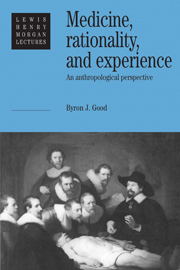Book contents
- Frontmatter
- Contents
- List of figures
- Foreword by ANTHONY T. CARTER
- Preface
- 1 Medical anthropology and the problem of belief
- 2 Illness representations in medical anthropology: a reading of the field
- 3 How medicine constructs its objects
- 4 Semiotics and the study of medical reality
- 5 The body, illness experience, and the lifeworld: a phenomenological account of chronic pain
- 6 The narrative representation of illness
- 7 Aesthetics, rationality, and medical anthropology
- Notes
- References
- Author Index
- Subject Index
3 - How medicine constructs its objects
Published online by Cambridge University Press: 05 June 2012
- Frontmatter
- Contents
- List of figures
- Foreword by ANTHONY T. CARTER
- Preface
- 1 Medical anthropology and the problem of belief
- 2 Illness representations in medical anthropology: a reading of the field
- 3 How medicine constructs its objects
- 4 Semiotics and the study of medical reality
- 5 The body, illness experience, and the lifeworld: a phenomenological account of chronic pain
- 6 The narrative representation of illness
- 7 Aesthetics, rationality, and medical anthropology
- Notes
- References
- Author Index
- Subject Index
Summary
In a discussion among several second year Harvard medical students in which I was participating, one young woman described how she felt her medical education was changing her.
Medical school is really weird. It is a forced emotional experience. We handle cadavers, have feces lab where we examine our own feces, go to [a mental hospital where we get locked up] with screaming patients. These are total experiences, like an occult thing or boot camp.
… it's not just an extension of college. College was also a total experience, but you could get by with less direct engagement, and still learn things. Here you have to interact with the information. When you dissect a brain you have to interact with these things and with your own feelings. Look at what you're playing with.
I feel like I'm changing my brain every day, molding it in a specific way – a very specific way.
How medical students learn medicine, how they “change their brains every day,” how they “interact with their information,” offers insight into the highly specialized world of American clinical medicine. Analysis of this process will serve as entree to a set of claims about the relation of culture, illness, and medical knowledge which I want to develop in the remaining chapters of this book. I begin with a discussion of how medicine constructs the “objects” to which clinicians attend, arguing that medicine formulates the human body and disease in a culturally distinctive fashion, using students' descriptions of how they learn and how they change as a basis for insight into this process.
- Type
- Chapter
- Information
- Medicine, Rationality and ExperienceAn Anthropological Perspective, pp. 65 - 87Publisher: Cambridge University PressPrint publication year: 1993
- 4
- Cited by

